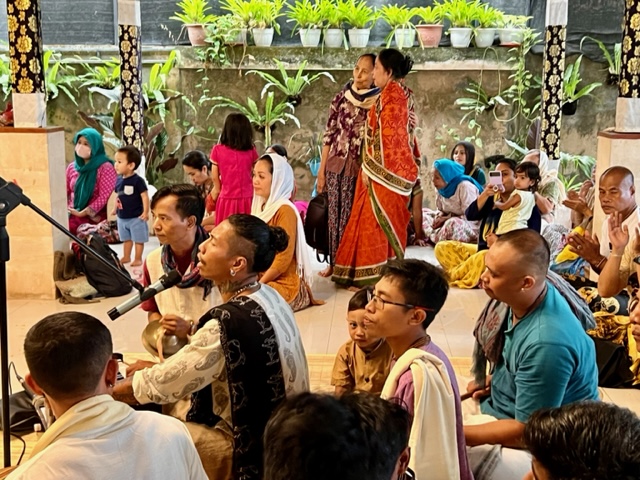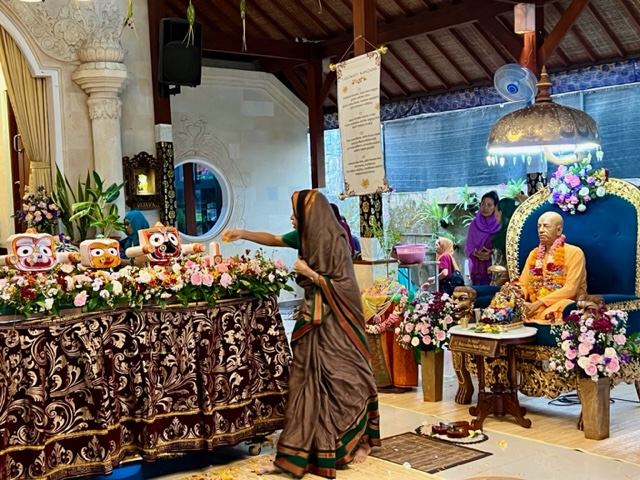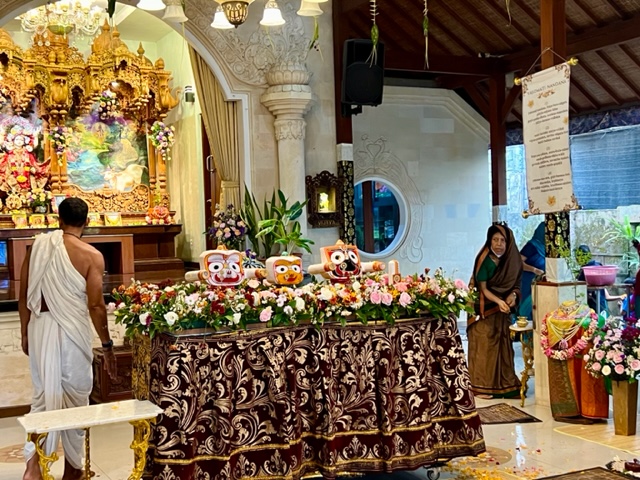HH Bhaktimarga Swami Bhagavat Gita 15.6 and 15.7
→ Dandavats
Read More...
Websites from the ISKCON Universe
For all ISKCON devotees, the completion and opening of the TOVP should be a top priority, as per Srila Prabhupada’s desire and instructions. A major milestone towards that goal is the October opening of the completed Nrsimhadeva Wing, which will be the largest and most opulent Nrsimhadeva Temple in the world.
To accomplish this historic task, we continue to need your financial assistance, large or small. For that purpose, an electronic ‘Pledge Card’ has been created so you make your sankalpa with Lord Nrsimhadeva and reciprocate with our Divine Protector to show your love and build His new home in Sridham Mayapur, ISKCON’s World Headquarters.
You don’t have to make any initial payment, and pledges can be paid in monthly installments over 2-3 years. Simply fill out the pledge card and we will contact you with the payment methods that are available in your region of the world so you can immediately start donating funds.
Please take advantage of this once-in-a-lifetime opportunity to serve Mayapur Prahlad- Nrsimhadeva Who are always protecting Their devotees, and make your sankalpa TODAY!
TOVP Give To Nrsimha Electronic Pledge Card
Visit: www.tovp.org
Support: https://tovp.org/donate/
Email: tovpinfo@gmail.com
Facebook: www.facebook.com/tovp.mayapur
YouTube: www.youtube.com/c/TOVPinfoTube
Twitter: https://twitter.com/TOVP2022
Telegram: https://t.me/TOVP_GRAM
WhatsApp: https://chat.whatsapp.com/LQqFCRU5H1xJA5PV2hXKrA
Instagram: https://m.tovp.org/tovpinstagram
App: https://m.tovp.org/app
News & Texts: https://m.tovp.org/newstexts
RSS News Feed: https://tovp.org/rss2/
Store: https://tovp.org/tovp-gift-store/
Podcast:


The Snana yatra bathing ceremony of Lord Jagannath has become one of the most popular festivals on the Iskcon calendar over the years since His Divine Grace Srila A.C. Bhaktivedanta Swami Prabhupada introduced it to the world outside of India.
Traditionally this festival has been going on since the time of the carving of the ‘Dharu-brahman’ Deities of Lord Jagannath, Lord Balaram, and Lady Subhadra in Sri Purushottam Kshetra (Jagannath Puri) thousands of years ago, commemorating Their sacred appearance for Their devotees – primarily the saintly King Maharaj Indradyumna.
Many of you would know that after the bathing ceremony Their Lordships catch a transcendental chill, are fed sweet foods and drinks to break Their fever, and then retire for Their ‘Anavasara kala’ – recuperation period. This festival was observed very beautifully at our Jagannatha Gauranga Temple in Bali where many hundreds of devotees attended.


The drama, Arrival of Nrsimhadeva in Mayapur: The Journey from Fear to Shelter, is a play performed by ISKCON Pune devotees in 2020, based on the amazing and miraculous story of the making and arrival of the Prahlad-Nrsimhadeva deities in ISKCON Mayapur. The video of the drama is a production of Radha Kunjabihari Media Services.
The history begins on March 24, 1984 when 35 dacoits attacked ISKCON Mayapur, injured many devotees and stole chota Radha Madhava. Fearing further attacks, several unsuccessful attempts were made by Mayapur devotees to have a Nrsimha deity made for protection. After many months, a sthapati (deity carver) finally agreed, and two years later the deities of Prahlad-Nrsimha were finished and brought to Mayapur for a three-day installation festival from July 28-30, 1986. Since then, there have been no further attacks, and many miracles have been performed by the Lord. Those lilas can be read in the free online flipbook, Lord Nrsimhadeva, ISKCON Mayapur.
2023 marks the 37th Anniversary of Their installation, being celebrated on July 28-30. We present this history to the worldwide ISKCON community for their pleasure in conjunction with the scheduled opening on the completed Nrsimhadeva Wing inside the TOVP, the largest Nrsimhadeva temple in the world, in the Fall of this year during a three-day festival.
Along with presenting the drama video, we have also published a free online flipbook, Lord Nrsimhadeva Arrives in Mayapur with the full narration by Atma-tattva das (ACBSP), who arranged for the carving of the murti, and many never-before-seen photos of Prahlad-Nrsimha in the making and Their arrival in Sridham Mayapur.
This also presents to all devotees another amazing opportunity to help complete the new home of Mayapur Nrsimhadeva. Please visit the Give To Nrsimha 2023 Fundraiser page on the TOVP website and show the Lord your love and appreciation for His protection by sponsoring a Nrsimha brick with your name inscribed and placed permanently under His altar or one of many other sponsorship options.
Sponsor a Nrsimha Brick Today.
Read and download the flipbook.
Help complete Lord Nrsimhadeva’s new home and be a part of history today!
Visit: www.tovp.org
Support: https://tovp.org/donate/
Email: tovpinfo@gmail.com
Facebook: www.facebook.com/tovp.mayapur
YouTube: www.youtube.com/c/TOVPinfoTube
Twitter: https://twitter.com/TOVP2022
Telegram: https://t.me/TOVP_GRAM
WhatsApp: https://chat.whatsapp.com/LQqFCRU5H1xJA5PV2hXKrA
Instagram: https://m.tovp.org/tovpinstagram
App: https://m.tovp.org/app
News & Texts: https://m.tovp.org/newstexts
RSS News Feed: https://tovp.org/rss2/
Store: https://tovp.org/tovp-gift-store/
Brahmacharis from the Monastery of the Holy Name in Lithuania continue their summer Harinama Sankirtana Tour to many Baltic and European cities. The tour, which has happened annually since 2009, has already shared the Holy Names in Warsaw, Wrocław, Lodz, Prague, Brno, Vienna, Ljubljana, Verona, and Milan. There are many countries and cities ahead. To join […]
The post Harinama Sankirtana Tour Continues To Visit Many Baltic and European Cities This Summer appeared first on ISKCON News.
Devotees in Arizona have recently opened a home temple and community outreach center called Mantra Oasis on the east side of Tucson. The 3-bedroom house is located in a nice eastside neighborhood that has a very large family room which makes a perfect temple room/gathering hall for guests. The new Mantra Oasis project was spearheaded by […]
The post Preaching Expands in Tucson with the Opening of a New Home Temple Community called Mantra Oasis appeared first on ISKCON News.
Photo courtesy of Pixabay. The Radhadesh community has restarted its community beehive project and has installed a new electric car charger to encourage sustainable transportation. These two projects are part of its overall environmental initiatives, a pillar of the community’s key vision. In particular, beekeeping is part of its plan to enhance biodiversity on the […]
The post Radhadesh strengthens sustainability initiatives with beehives and electric car charger appeared first on ISKCON News.
The Hare Krishna Movement is arguably among the world’s most misunderstood spiritual paths, externally appearing biased along sectarian lines but with an inclusive and non-sectarian core philosophy. Srila Prabhupada faced the monumental task of delivering this fully inclusive message of Sanatan Dharma (the eternal position of all souls) while presenting it with all the cultural […]
The post Its About Progress, Not Perfection appeared first on ISKCON News.
Sri Madhu Pandit Dasa presents a gift to High Commissioner Milinda Moragoda, joined by Sri Chanchalapathi Dasa. In May, Milinda Moragoda, the Sri Lankan High Commissioner Designate to India, visited ISKCON’s Akshaya Patra Foundation‘s world-famous Rajajinagar kitchen in Bangalore to learn about their comprehensive mid-day meal program for school children. The visit aimed to consider the […]
The post Sri Lankan High Commissioner Visits Akshaya Patra Leaders and Tours Bangalore Kitchen appeared first on ISKCON News.
On May 31st, ISKCON devotees in Jos, Nigeria, spoke to over 100 university students in the Department of Religious Studies at the University of Jos. The 2.5-hour presentation, “Krishna Consciousness: An Aspect of Hinduism,” offered by Salika Das, was interactive, intense, and educational. Jos is a city located in the central part of Nigeria with […]
The post Nigerian Devotee Speaks to 100+ Students at Local University appeared first on ISKCON News.
Class by His Holiness Bhakti Brhat Bhagavata Swami, Founder of The Bhaktivedanta College of Education and Culture. Nrsimhananda Das, a dedicated and influential devotee within ISKCON South Africa, has embarked on a remarkable journey of spiritual growth and service since 1985. His passion for studying and teaching Srila Prabhupada’s books led him to participate in […]
The post Nrsimhananda Das: Inspiring Krishna Conscious Education in ISKCON South Africa appeared first on ISKCON News.

Srila Prabhupada’s mood (video)
Srimad Bhagavatam class by HG Srutakirti Prabhu at ISKCON Vrindavan.
 By Vijaya Das
By Vijaya Das Vaisesika Prabhu and his jolly team of book distributors at ISKCON of Silicon Valley (ISV) are doing humongous book distribution through motels. For those of you who don't know, it's called Motel Gita; they've done it for years. Some devotees attend the annual convention of motel owners, and they sign-up especially the Indian motel owners, who put the books in the rooms for guests. In April, the ISV devotees put 19,300 Gitas in motels around the USA and was the No. 1 temple America, with 27,759 book points. Over the years, Motel Gita has distributed 850,000 Bhagavad Gitas this way, along with 90,000 other books like SSR, POY, Chant and be Happy, Higher Taste and Krsna Book. In other countries (New Zealand, India, and Canada), 10,000 Bhagavad Gitas have been distribute to motels. Individual scores: Hemagiri Prabhu, in Mumbai, a long-time top book distributor, was No. 1 in April, with 4,008 book points. Another amazing individual, whom we're just hearing about recently, is Bhakta Avatar in Austin, Texas. He was the No. 1 distributor worldwide of Arabic books, with 624 book points. Along with other books, he did a total of 2,321 book points.
Continue reading "WSN April 2023 – World Sankirtan Newsletter
→ Dandavats"

Sunday 4th June from 11am onwards. See poster for details.